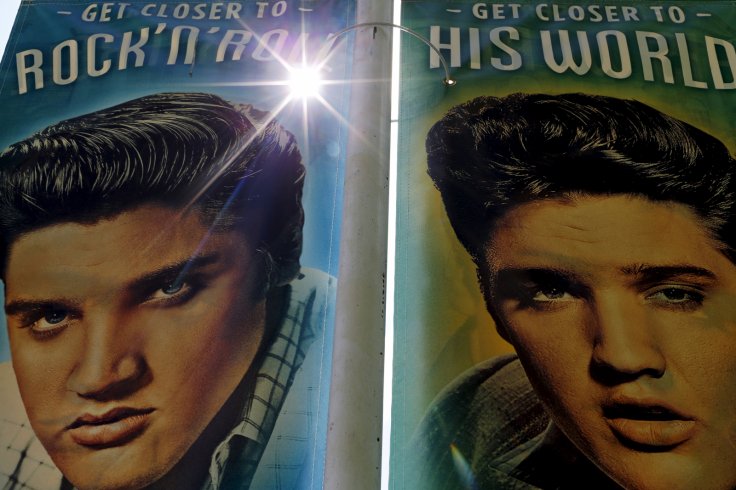
Melding a range of disparate influences, along with his energetic jiving, to create a new musical form that still sways listeners -- and in its time, helped break racial barriers in the US -- he became a best-selling and influential solo musician of his generation and a significant cultural icon. That explains Elvis Presley's depictions across all media, save literature, where his appearances rarely match his status.
His fictional forays -- which span cosmic comedy, high fantasy, science fiction, horror and more, by authors from Douglas Adams to Sir Terry Pratchett (along with Neil Gaiman), from Stephen King to Rick Riordan and Robert Rankin to John Grisham -- see him appear in various guises and forms but rarely in the way we know him.
And that is rather unfortunate, for Elvis Aaron Presley's (1935-77) life has all the makings of a captivating story. From a humble, working-class background in the first two decades of his life, he rose to global fame which he retained in his remaining life -- despite his visible physical decline in the final years of his short but eventful life.
While extremely good-looking, he, however, did not fit other perceived traits of a music star. He had good relations with his parents, was courteous to all, respected fellow singers and acknowledged many as better, and hated the title "King of Rock 'n' Roll". However it was drugs, through prescription, not illicit, which led to his untimely death -- leaving many people shocked, and others suspicious.
This is behind the most familiar Elvis trope -- "Elvis Lives". It works on the supposition that Elvis is not dead, and that, either by conspiracy, alien abduction (and later return), or retirement, he is still among us. Another trope, also inspired by this, is "Elvis Has Left the Planet" (based on the announcement "Elvis has left the building" after his concerts, intended to make people, hoping for an encore, leave the venue), where it contends that he had been abducted by aliens, or that he was an alien himself.
Related tropes "Elvish Presley" or "Elvis Impersonators" are self-explanatory.
It is, however, two earlier tropes that are most common. A prime example of both is Pratchett and Gaiman's uproarious "Good Omens".
Describing a tabloid, a typical issue would tell you "...how Elvis Presley was recently sighted working in a Burger Lord in Des Moines; how listening to Elvis records cured a Des Moines housewife's cancer... and that Elvis was taken by Space Aliens in 1976 because he was too good for this world". A footnote tells us one of these is true. Shortly, there's a scene in a Burger Lord in Des Moines, as the franchise owner (Famine, of the Horsemen of Apocalypse) makes a mental note to fire the cook, because his crooning of "Love Me Tender" clashes with the franchise-mandated canned music.
Then, towards the denouement, there's a scene in which a mysterious stranger is playing a video trivia game in a pub -- and winning heavily. He happens to be Death himself, for he refuses to answer "What year did Elvis Presley die in?", saying, "I don't care what it says, I never laid a finger on him."
Elvis, though not named, comes up in "Mostly Harmless", Adams' final book in the trilogy of five (which began with "The Hitchhiker's Guide to the Galaxy"), where main characters Arthur Dent and Ford Prefect come across a bar called "The Domain of The King" on an arid, alien planet where a fatter, balder Presley sings. He tells Ford that he was not abducted by aliens but went with them willingly.
He also has a spaceship -- bright pink and with the letters "EP" emblazoned on it -- which he gives to Ford gratis, and Ford, who is moved to tears when he sings "Love Me Tender", leaves him something. When he tells the figure, Dent can't grasp it and asks what it would buy. After some thinking, Ford replies, "Switzerland."
Jack Womack's dystopian science fiction novel "Elvissey", set in 2033 where a sinister MNC runs the world, sees it facing problems from a mass religious movement believing Elvis was a semi-divine figure performing miracles and decides to resolve this problem by getting a younger, alternate-history Elvis to the present to discredit his reputation.
In "You Know They Got a Hell of a Band", a story in Stephen King's "Nightmares & Dreamscapes", he is there in a form where you pray you never meet him, for the concert goes on (and on) and "you can check out anytime you like but never leave".
In "Comeback Tour", a novel set in Games Workshop's Dark Future setting, Elvis, a private law-enforcement officer in the Deep South, uses his music to defeat an evil religion; "Scotland The Brave", a novel of the long-running "Highlander" fantasy film and TV series, explains he is an immortal who "died" because he was getting too famous, and he's referred to as a "magician" in the first of Rick Riordan's Egyptian mythology-themed "Kane Chronicles" -- and the main characters are supposed to retrieve an artefact from his Graceland mansion in Memphis.
There are others too, but none showing him as he was -- unfortunately. That is the real "Heartbreak Hotel".
(IANS)


